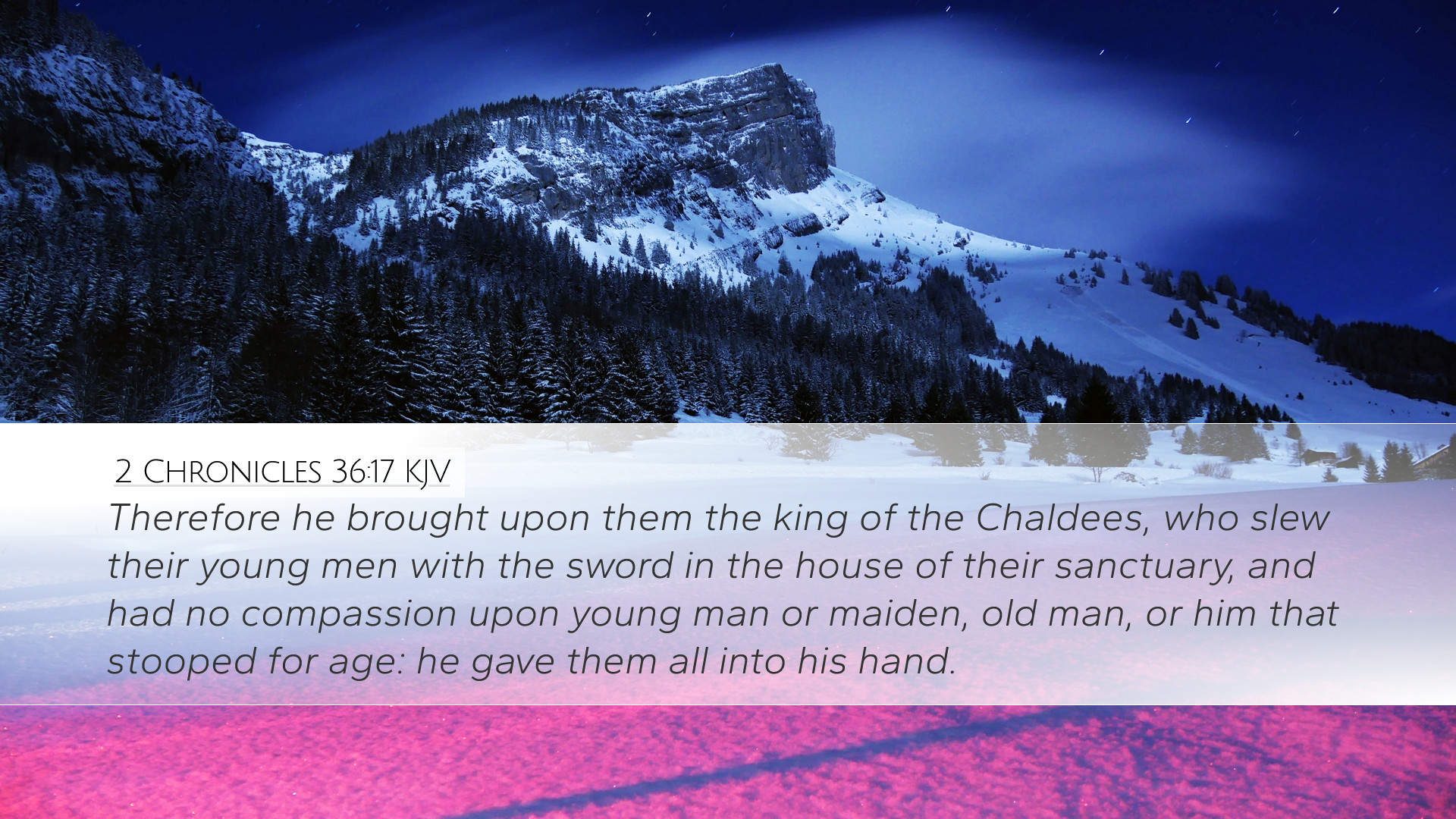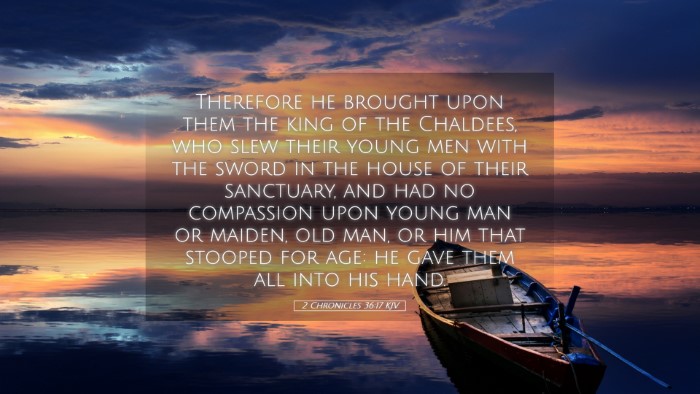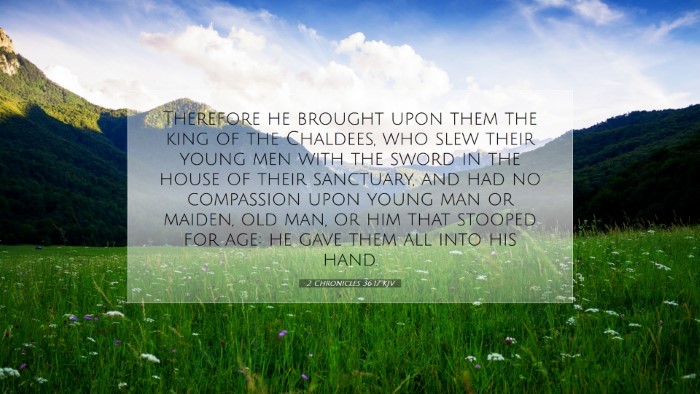Commentary on 2 Chronicles 36:17
Verse Reference: 2 Chronicles 36:17 - "Therefore he brought upon them the king of the Chaldees, who slew their young men with the sword in the house of their sanctuary, and had no compassion upon young man or maiden, old man, or him that stooped for age: he gave them all into his hand."
Historical Context
The verse encapsulates a pivotal moment in Israel’s history, marking the culmination of a repetitive cycle of disobedience, idolatry, and eventual divine judgment. The chronicler outlines the disastrous consequences of Israel's turning away from God. It is critical to examine this within the broader historical context of the Babylonian Exile, where Judah faced devastation due to their persistent rebellion against God.
Insights from Commentaries
Matthew Henry
Matthew Henry emphasizes the justice of God in this passage. He notes that the king of the Chaldeans, representing divine retribution, was sent as a consequence of the nation’s sins. Henry highlights that this judgment was not random but a deliberate act reflecting God’s anger towards persistent unfaithfulness. He points out that the severity of the siege led to the slaughter of innocent lives, showcasing the tragic effects of divine judgment on the nation's spiritual condition.
- The Inviolability of God's Commandments: Henry articulates that when a nation forsakes God’s laws, it invites calamity upon itself. The failure to heed prophetic warnings amplifies this judgment.
- The Nature of Divine Justice: The absence of compassion exhibited by the Chaldean king reflects a deeper truth about divine justice—when God’s people stray, He allows their enemies to prevail.
- The Resulting Spiritual Devastation: The consequences of such actions are not only physical destruction but also spiritual desolation, as the sacred places of worship faced desecration.
Albert Barnes
Albert Barnes provides a thorough analysis of the phrase "he brought upon them." This indicates both divine sovereignty and agency—God actively orchestrating judgment. Barnes carefully points out that the desolation resulted from Judah's refusal to repent and heed the numerous warnings from prophets. The lack of compassion in the conquest serves as a sobering reminder of the harsh realities of sin.
- The Role of Prophetic Warnings: Barnes asserts that the voices of the prophets were frequently ignored, which ultimately invited this calamity upon Judah.
- The Universal Reach of Judgment: His commentary emphasizes that God’s wrath does not discriminate; young and old alike suffered, demonstrating that judgment can be indiscriminate in its application.
- The Theological Significance: The verse illustrates that moral decay leads to societal collapse, a principle that remains relevant throughout history.
Adam Clarke
Adam Clarke's commentary delves into the socio-political dimensions of the text. He describes the Chaldeans not merely as inflictors of violence but as agents used by God to fulfill His covenantal obligations towards Israel. Clarke elaborates on the devastation inflicted in the sanctuary, which signifies the loss of the unique relationship between God and His people due to sin.
- The Literal and Spiritual Interpretation: Clarke suggests that the physical act of slaying in the sanctuary points to a deeper spiritual truth—the rejection of God leads to the abandonment of His presence.
- Reflection on God’s Sovereignty: By allowing such violence, Clarke underlines God’s sovereignty in judgment, reinforcing the idea that nothing is beyond His control, even chaos.
- Lessons for Modern Believers: Clarke's insights challenge present-day believers to understand the weight of sin and the seriousness of divine judgement, encouraging a robust theological reflection on the nature of God's justice.
Theological Reflections
The enormity of God’s judgment articulated in this verse urges a reflection on various theological themes:
- The Nature of God’s Justice: The passage illustrates that God’s justice is not capricious but a necessary response to human sin. It emphasizes the justice meted out to those who disregard His commands.
- God’s Patience and Wrath: The chronicler beautifully captures the tension between God’s patience with a wayward people and His ultimate wrath when provoked beyond measure.
- The Role of the Church Today: This narrative serves as a stark reminder to the contemporary church about the dangers of spiritual complacency and the necessity of remaining faithful to God’s word.
Conclusion
In conclusion, 2 Chronicles 36:17 serves as a multi-layered reflection on the relationship between God and His wayward people. The insights from Matthew Henry, Albert Barnes, and Adam Clarke highlight the gravity of sin, the nature of divine judgment, and the call to heed prophetic warnings. This passage, therefore, invites pastors, students, and scholars to engage in deep theological reflection on the implications of disobedience and the need for repentance in the life of believers.


